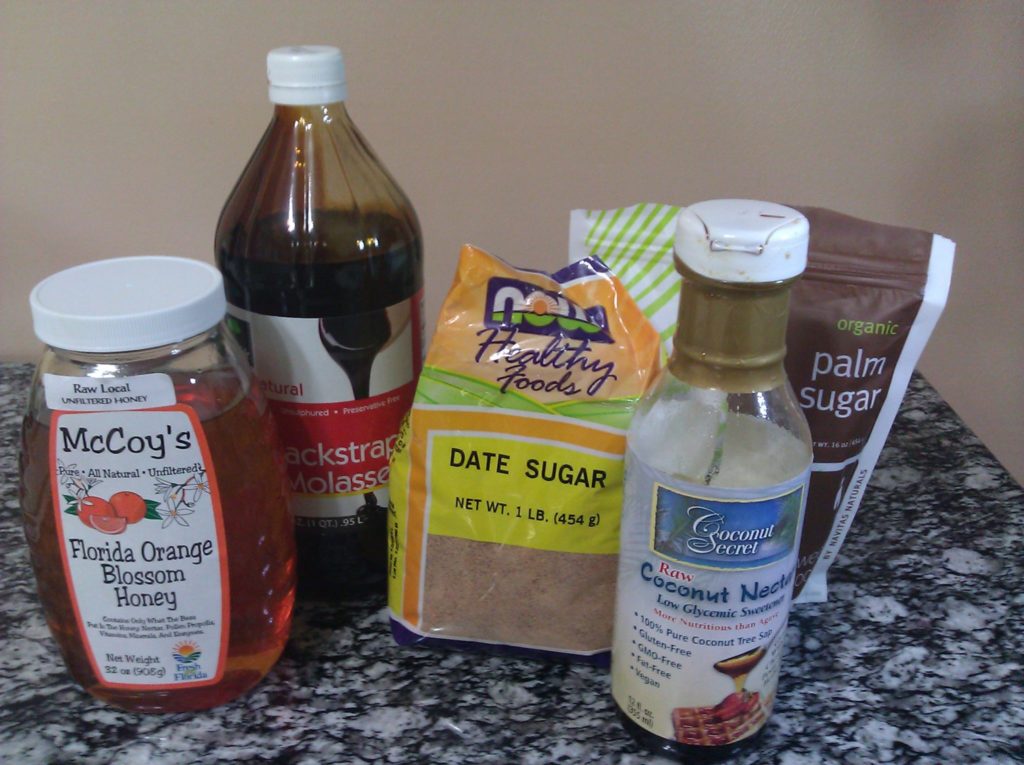Table of Contents[Hide][Show]
 In my article on how to get off sugar, the recommended first step is to replace all refined sweeteners with natural sweeteners.
In my article on how to get off sugar, the recommended first step is to replace all refined sweeteners with natural sweeteners.
Which natural sweeteners are best? Which ones are optimal for those with blood sugar problems?
In this latest video filmed for the Weston A. Price Foundation, I catalog the list of wholesome sweeteners and discuss which ones to avoid and which ones to use and for what purpose.
Sweet Doesn’t Have to Be Unhealthy!
Sugar is simultaneously demonized and revered in our culture. Most people are hopelessly addicted even if they don’t know it. The key isn’t to abandon all things sweet, but to embrace our need for sweet in a non-addictive way.
Which wholesome sweeteners to use in moderation? Clues come from our healthy, chronic disease free ancestors!
The video below will give you some good starting ideas. If you need more information, there are numerous articles about both natural sweeteners and alternative sweeteners on this blog that dig deep into each one individually discussing both pros and cons.
- Maple syrup
- Monk fruit
- Stevia
- Coconut sugar
- Xylitol
- Malted barley
- Swerve
- Erythritol
- Rice syrup
- Agave
- Yacon syrup
- Turbinado sugar
- Honey
Video on Natural Sweeteners
Be sure to check out my Resources page for places to source quality, wholesome sweeteners – even the hard to find, low glycemic ones mentioned in the video.
For a complete transcript of this video lesson in any language, click here.
Sarah, The Healthy Home Economist








Video: Which Natural Sweeteners are Best? – The Healthy Home Economist http://t.co/4J3jCl4
Sarah, do you know anything about lucuma? I’m talking about the powder available in health food stores and online. It seems that it’s only dried fruit (similar to date sugar) and it’s ‘raw’ which I assume means dried at low temps. I haven’t found out yet if it’s legal on GAPS or not – it’s more than half glucose, with fructose and a tiny bit of sucrose.
Magda,
I’m curious about lucuma too. Sarah, I hope you find some time to address this sweetener. I am also curious about momordica or Luo Han Guo.
I was certainly interested in this video. I just saw Florida crystals in the grocery store and wondered about it. I’m glad someone asked about it. I’ve been cutting back on the sugar/sweetener called for in some recipes. Since I have changed our diet here at home I find all that sugar is just too much now. Since you mentioned stevia I have to say I just bought the liquid recently, thinking it was ok. I am so glad you put the info out there because it is confusing. I have a question. I am wanting to make kombucha and I am supposed to use white sugar. I have never seen organic white sugar. Is it ok to use regular white? How do I know if it is gmo or not? Also, I made your angel food cake recipe, but only used 1 cup sugar (see, cutting back) and it was so good! I’ve been wanting to tell you that. Thanks, Sarah.
Hi Linda, you can use regular white sugar for kombucha if you can’t find organic white sugar. The sugar is used up when you ferment for the proper amount of time (no less than 7-8 days). I usually ferment for 10 days or so to make sure all the sugar is gone. If it gets too strong, you can dilute with seltzer or mix with a flavored tea or fruit juice to soften the vinegar-y taste if necessary.
So glad the angel food cake turned out well! 🙂
i usre sorghum syrup alot…not available everywhere…i ordered mine from a family farm in tenn..similar to mollasses but milder…supposed to have a higher mineral content..
I was so excited to find “organic raw sugar” at Costco a few months ago! The label says “made from freshly squeezed cane juice that is evaporated and crystallized on the same day it is harvested. No chemicals, pesticides or herbicides. In accordance with strict organic standards.” Do you still think this is bad too? The color is somewhere between white and brown sugar.
Unfortunately, I have no doubt some molasses has been removed (the same day of course).
It’s amazing how tricky words can be used to fool the consumer.
If it was TRULY cane juice with NOTHING removed, it would be dark brown with the consistency of sucanat as this is what sucanat is.
great info! I had never heard of Sucanat. I will definitely be looking for this! I cannot wait to try it!
We’ve all been fooled at one time or another with the games food manufacturers play. I used to buy Florida Crystals back in the day when I thought it was truly raw and unprocessed. Been using sucanat now for many years .. the fact that Florida Crystals is advertised on TV should have been my tip off. Only processed foods are advertised on TV!!! Real Food never is (at least I’ve never seen it advertised!)
Wow thanks SO much for that info! I was just about to go and buy some today — good timing 🙂
It’s true about sweat not smelling bad on a natural diet! I only have to wear deodorant (or baking soda, or lavender oil, or carry a spray bottle of hydrogen peroxide in my purse) now if I know there’s a chance I’ll be eating or drinking something processed (at a party, for example).
Hi Jane, Sugar in the Raw is turbinado sugar and it is processed. I would suggest using sucanat instead. I don’t know how these manufacturers get away with this misleading advertising that they so boldly put on their labels.